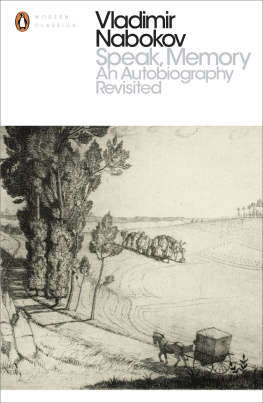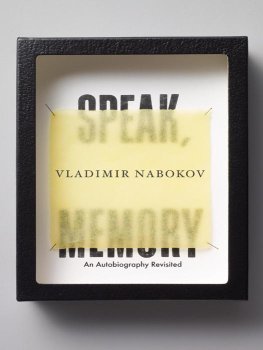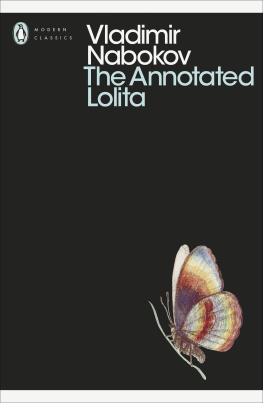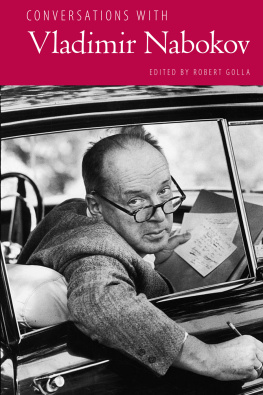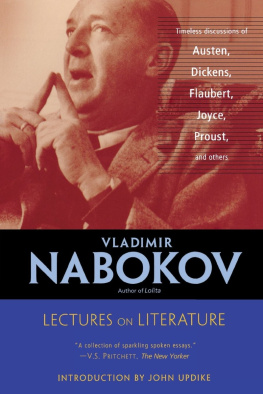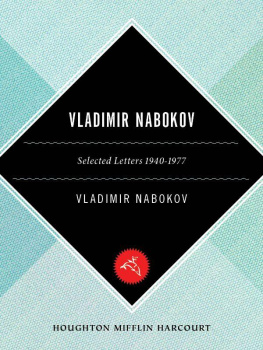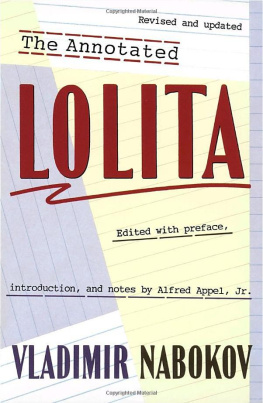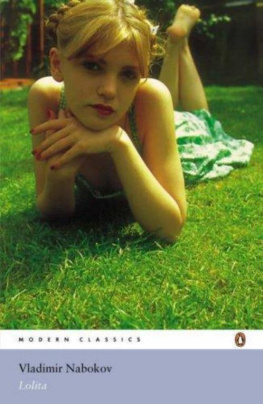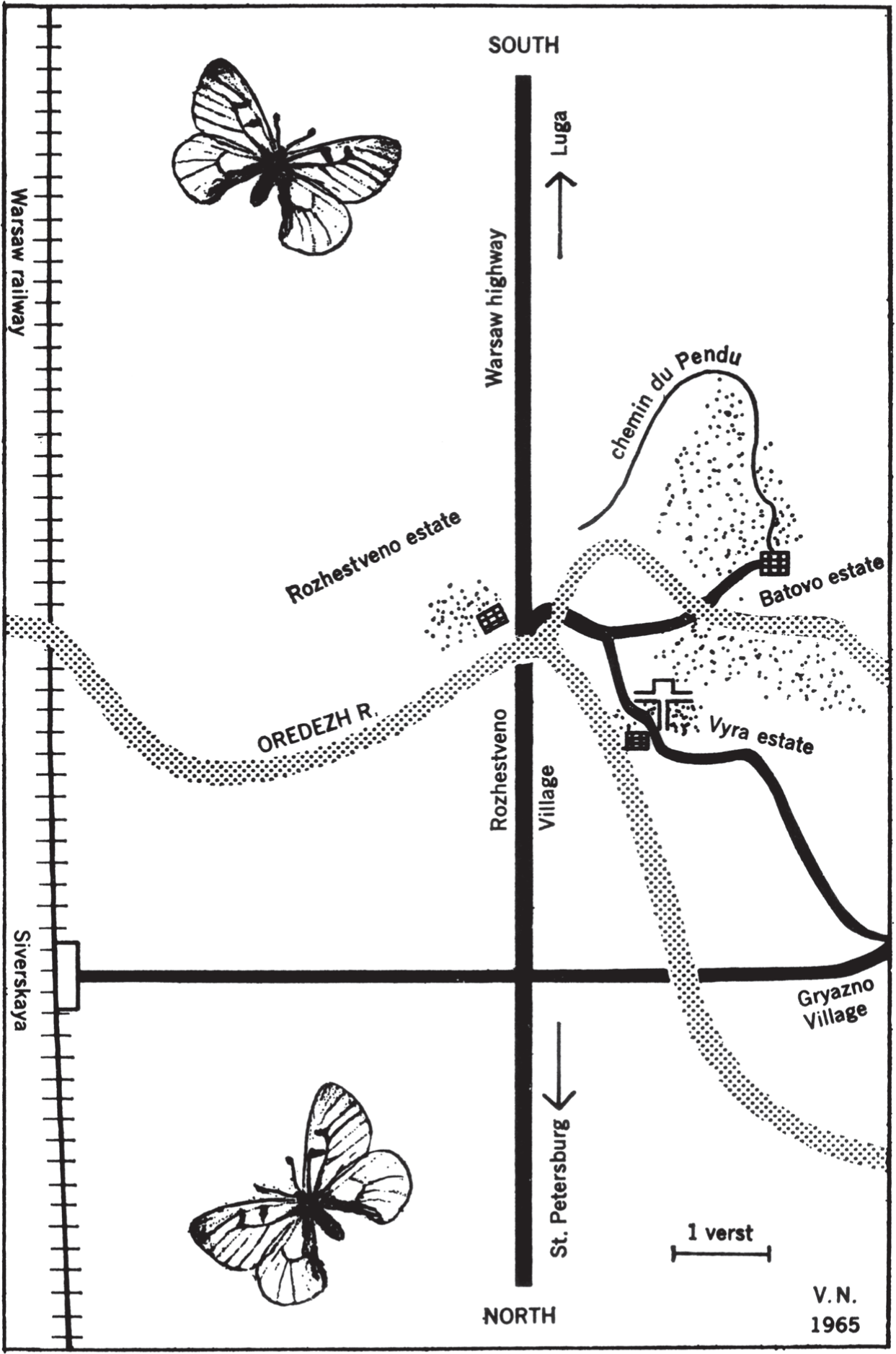Contents
Vladimir Nabokov
SPEAK,MEMORY
An Autobiography Revisited
PENGUIN BOOKS
UK | Canada | Ireland | Australia
NewZealand | India | South Africa
Penguin Books is part of the Penguin RandomHouse group of companies whose addresses can be found at global.penguinrandomhouse.com.
www.penguin.co.uk
Originally published under the titleConclusive Evidence
This edition has been revised andexpanded
First published in Great Britain by Weidenfeld & Nicolson1967
Published in Penguin Books 1969
Reprinted with a new appendix inPenguin Classics 2000
This edition published in Penguin Classics 2012
Copyright 1947, 1948, 1949, 1950, 1951by Vladimir Nabokov
Copyright Article 3C Trust under the Will of VladimirNabokov, 1967
Cover: Near Dieppe, etching on paper (1919)by Meredith Frampton, Tate, London 2016.
All rights reserved
The moral right of the author has beenasserted
This edition published by arrangement withWeidenfeld & Nicolson, London, and the Estate of Vladimir Nabokov
All the characters in this book arefictitious and any resemblance to actual persons, living or dead, is purelycoincidental
ISBN: 978-0-14-191231-8
To VRA
Foreword
The present work is a systematicallycorrelated assemblage of personal recollections ranging geographically from StPetersburg to St Nazaire, and covering thirty-seven years, from August 1903 to May 1940,with only a few sallies into later space-time. The essay that initiated the seriescorresponds to what is now . I wrote it inFrench, under the title of Mademoiselle O, thirty years ago in Paris, where JeanPaulhan published it in the second issue of Mesures, 1936. A photograph(published recently in Gisle Freunds James Joyce in Paris) commemorates thisevent, except that I am wrongly identified (in the Mesures group relaxingaround a garden table of stone) as Audiberti.
In America, whither I migrated on 28 May1940, Mademoiselle O was translated by the late Hilda Ward into English, revised byme, and published by Edward Weeks in the January 1943 issue of The AtlanticMonthly (which was also the first magazine to print my stories written inAmerica). My association with The New Yorker had begun (through Edmund Wilson)with a short poem in April 1942, followed by other fugitive pieces; but my first prosecomposition (Gardens and Parks, 17 June 1950), allwritten in Ithaca, N.Y.
Of the remaining three chapters, Chapters appeared in the Partisan Review (First Poem, September 1949, and Exile,JanuaryFebruary 1951), while Chapter Thirteen went to Harpers Magazine(Lodgings in Trinity Lane, January 1951).
The English version of Mademoiselle O hasbeen republished in Nine Stories (New Directions, 1947), and NabokovsDozen (Doubleday, 1958; Heinemann, 1959; Popular Library,1959; and Penguin Books, 1960); in thelatter collection, I also included First Love, which became the darling ofanthologists.
Although I had been composing these chaptersin the erratic sequence reflected by the dates of first publication given above, theyhad been neatly filling numbered gaps in my mind which followed the present order ofchapters. That order had been established in 1936, at the placing of the cornerstonewhich already held in its hidden hollow various maps, timetables, a collection ofmatchboxes, a chip of ruby glass, and even as I now realize the view from my balconyof Geneva lake, of its ripples and glades of light, black-dotted today, at teatime, withcoots and tufted ducks. I had no trouble therefore in assembling a volume which Harper& Bros. of New York brought out in 1951, under the title ConclusiveEvidence; conclusive evidence of my having existed. Unfortunately, the phrasesuggested a mystery story, and I planned to entitle the British edition Speak,Mnemosyne but was told that little old ladies would not want to ask for a bookwhose title they could not pronounce. I also toyed with The Anthemion which isthe name of a honeysuckle ornament, consisting of elaborate interlacements and expandingclusters, but nobody liked it; so we finally settled for Speak, Memory(Gollancz, 1951, and The Universal Library, N.Y., 1960). Its translations are: Russian,by the author (Drugie Berega, The Chekhov Publishing House, N.Y., 1954),French, by Yvonne Davet (AutresRivages, Gallimard, 1961), Italian, by Bruno Oddera (Parla, Ricordo,Mondadori, 1962), Spanish, by Jaime Pieiro Gonzles (Habla, memoria!, 1963)and German, by Dieter E. Zimmer (Rowohlt, 1964). This exhausts the necessary amount ofbibliographic information, which jittery critics who were annoyed by the note at the endof Nabokovs Dozen will be, I hope, hypnotized into accepting at the beginningof the present work.
While writing the first version in America Iwas handicapped by an almost complete lack of data in regard to family history, and,consequently, by the impossibility of checking my memory when I felt it might be atfault. My fathers biography has been amplified now, and revised. Numerous otherrevisions and additions have been made, especially in the earlier chapters. Certaintight parentheses have been opened and allowed to spill their still active contents. Orelse an object, which had been a mere dummy chosen at random and of no factualsignificance in the account of an important event, kept bothering me every time I rereadthat passage in the course of correcting the proofs of various editions, until finally Imade a great effort, and the arbitrary spectacles (which Mnemosyne must have needed morethan anybody else) were metamorphosed into a clearly recalled oystershell-shapedcigarette case, gleaming in the wet grass at the foot of an aspen on the Chemin duPendu, where I found on that June day in 1907 a hawkmoth rarely met with so far west, and where a quarter of a centuryearlier, my father had netted a Peacock butterfly very scarce in our northernwoodlands.
In the summer of 1953, at a ranch nearPortal, Arizona, at a rented house in Ashland, Oregon, and at various motels in the Westand Midwest, I managed, between butterfly-hunting and writing Lolita andPnin, to translate Speak, Memory, with the help of my wife, intoRussian. Because of the psychological difficulty of replaying a theme elaborated in myDar (The Gift), I omitted one entire chapter (Eleven). On theother hand, I revised many passages and tried to do something about the amnesic defectsof the original blank spots, blurry areas, domains of dimness. I discovered thatsometimes, by means of intense concentration, the neutral smudge might be forced to comeinto beautiful focus so that the sudden view could be identified, and the anonymousservant named. For the present, final edition of Speak, Memory I have not onlyintroduced basic changes and copious additions into the initial English text, but haveavailed myself of the corrections I made while turning it into Russian. Thisre-Englishing of a Russian re-version of what had been an English re-telling of Russianmemories in the first place, proved to be a diabolical task, but some consolation wasgiven me by the thought that such multiple metamorphosis, familiar to butterflies, hadnot been tried by any human before.

